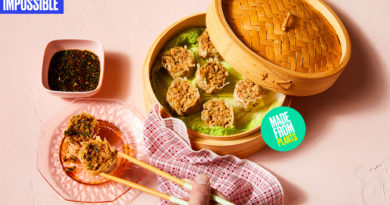Move Over Elsie, Vegan Dairy Is Better Than Ever
At the Plant Based World Expo, I was able to sample some great vegan dairy alternatives and talk to the companies that are bringing them to store shelves. There were a number of plant milks as well as sour cream, butter, and especially cheese. Appealing to a broad audience, plant-based dairy sales continue to rise dramatically, especially when compared to animal-based dairy. Aside from those favoring a vegan diet, many people are lactose intolerant or allergic to dairy proteins, and choose these alternatives. Of course, those who keep kosher and want to serve something like dairy at or after a meat meal can also take advantage of these products.
One of the challenges, as I have previously noted, is that many dairy alternatives, especially milks and cheeses found in the refrigerated case, are processed and packaged in plants that are kosher certified for dairy (and may also package dairy milk). Even if the product is 100% vegan, since the plant is certified “D”, the products carry a “D” or “DE” designation. Some agencies have actually told me that they consider certain products to be actual dairy, though they would not say why in specific cases. It could be that they cannot confirm the level of cleaning done between runs, or perhaps there is a dairy-free ingredient that comes to the plant in a package marked “D,” and the agency does not verify the ingredient’s status. It should be noted that in order to avoid an allergen warning, no trace of dairy proteins would be detectable, though kosher dairy status is not just about dairy proteins. A representative of a major certification agency told me that kosher consumers should try to persuade companies to insist on pareve designation as a means of getting around this limitation. Of course, one can simply choose brands that are marked pareve (a certification without a D or DE qualifier is pareve). All of the brands noted below are pareve, whether shelf-stable or refrigerated, except where noted.
Milk
I have been drinking plant-based milks almost exclusively for several years. My favorites have been cashew and oat, and these go very well in cereal, pancakes, and baking. One of the first brands I fell in love with was Elmhurst 1925. Named for the famous NYC dairy that closed several years ago, their milks have the fewest ingredients and the most nuts compared to their competitors. 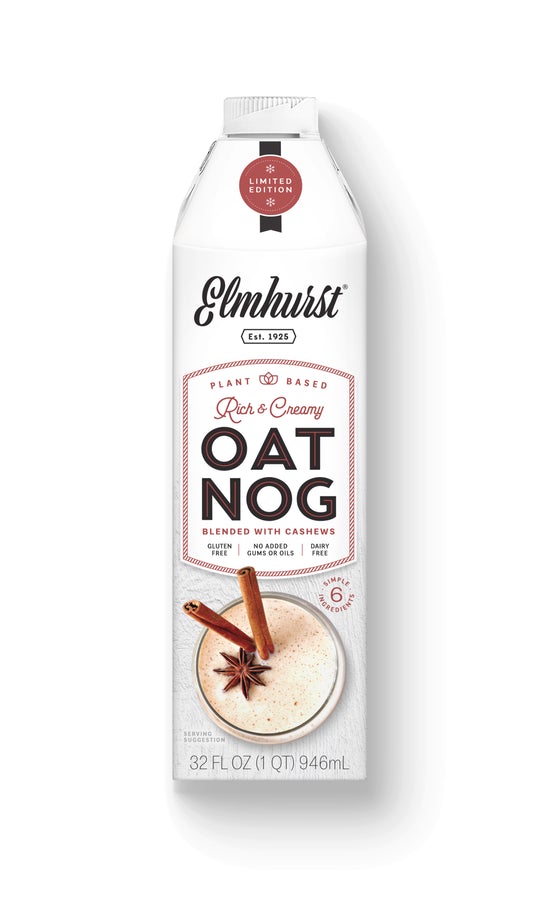 They tend to be thick and creamy without the gums, fillers, and emulsifiers found in other brands. Note, I am not against the use of gums; these are typically natural ingredients derived from plants. Unfamiliar names or hard to pronounce words do not tell you anything about the safety or desirability of an ingredient. If an apple were to list all of its ingredients, you would be hard pressed to recognize many of them). However, for those who want a simple and delicious product, this company proves that you don’t need those additives to achieve a thick, pleasing beverage. Unfortunately, as a result, they are more expensive than other nut milks. However, they are so good that you should splurge, at least occasionally. They also have some seasonal offerings. I tried Oat Nog, sold around New Years. Not quite the flavor of traditional non-vegan egg nog, but very sweet and yummy.
They tend to be thick and creamy without the gums, fillers, and emulsifiers found in other brands. Note, I am not against the use of gums; these are typically natural ingredients derived from plants. Unfamiliar names or hard to pronounce words do not tell you anything about the safety or desirability of an ingredient. If an apple were to list all of its ingredients, you would be hard pressed to recognize many of them). However, for those who want a simple and delicious product, this company proves that you don’t need those additives to achieve a thick, pleasing beverage. Unfortunately, as a result, they are more expensive than other nut milks. However, they are so good that you should splurge, at least occasionally. They also have some seasonal offerings. I tried Oat Nog, sold around New Years. Not quite the flavor of traditional non-vegan egg nog, but very sweet and yummy.
Elmhurst products, including coffee creamers, ready to drink lattes, and milks from pistachios, almonds, cashews, and other nuts, are available widely in supermarkets both in shelf-stable cartons and in the refrigerator section. Certification is by the OU.
Myracle Kitchen (Rebel Kitchen in the UK) brought Mylk across the pond. Made in Great Britain from oats, coconut cream, and fava beans, this is the first plant-based milk that, at least to me, tasted almost like real cow milk.
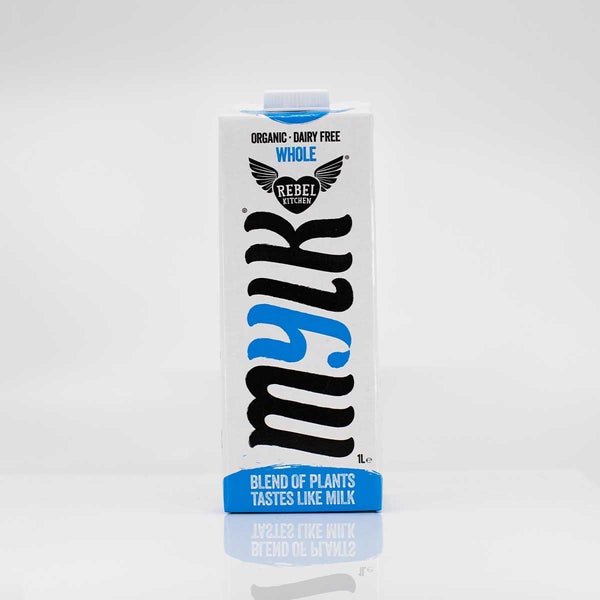
I like the others, and think they work well in just about anything I use them for, but this just tasted like…milk. Not yet widely available in the US and not all varieties have kosher certification, but this was a real winner, especially for those who don’t like nut milks. Certified by the OU.
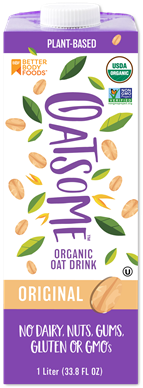
Another gum (and nut) free milk was Oatsome. Made with organic oats and sunflower oil, this had a creamy, mild flavor that goes particularly well with cereal and coffee. It is fortified with Vitamins B2, B12 and D. Certified by the OU in the US, and the KF in the UK.

For those seeking a more sustainable and higher protein plant-based milk, consider Hope and Sesame Milk. With more calcium than dairy and more protein than most nut and oat milks, it is made from upcycled sesame seeds that have had their oil extracted and would otherwise be wasted. Sesame plants are self-pollinating and thrive in dry climates, avoiding some of the problems with tree nut milks. This product is sustainable and very good. Available plain, unsweetened, vanilla, barista blend, and chocolate hazelnut, it is available both chilled and shelf-stable in supermarkets and online. Certified by the OU.
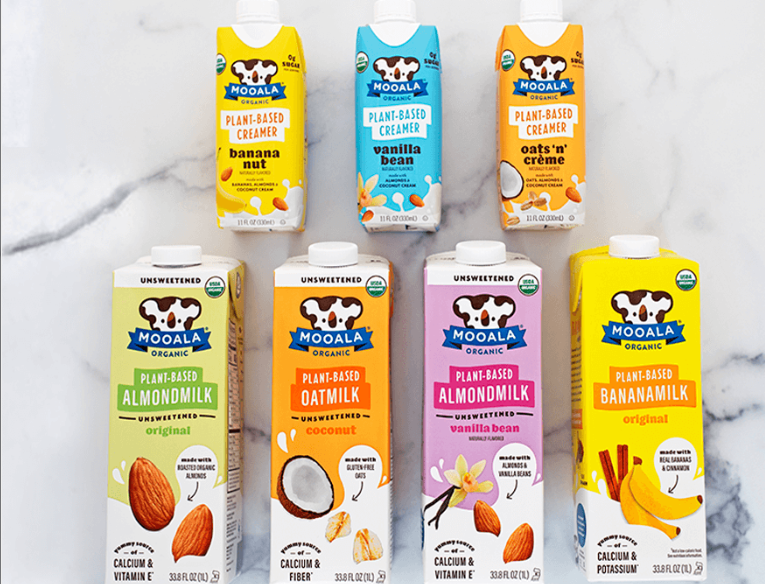
Finally, I tried Mooala mylks. They make a variety of oat, almond, and most intriguingly, banana milk. Not a smoothie, it has a very mild banana flavor and the aroma of banana bread. Works well in baking and with cereal—check out the recipe at the end of this post! Available in plain, strawberry, and chocolate; and if you are on the Keto diet, they make mylks and creamers in flavors like plain, vanilla, cinnamon roll, and chocolate chip. Other creamers are almond and coconut based (with and without banana). All Kof-K certified and shelf-stable, they can be purchased online, at Walmart, and many supermarkets.
Cheese and Cultured Dairy
Cheese is one of the hardest foods to make vegan. It gets its flavor from the type of animal milked, the foods the animal ate, the fat content, and the enzymes and culture used. It is a very complex food. Most vegan cheeses are made from nuts or pulses (almond, cashew, coconut, soya). Soft cheeses seem easier to get right, particularly spreads like cream cheese and herbed spreadable cheeses. Getting the flavor and texture for hard cheeses has been more of a challenge. Most vegan cheeses have also not done well in the meltability department.[1] However, more and more semi-soft and hard cheeses are coming out that do a great job at delivering the flavor and texture for particular applications, and some even melt well. In my taste tests, slices taste much, much better melted than in a sandwich. Heat brings out the flavor, and the texture improves significantly (cold, most are either dry or rubbery).
While I could not taste it at the show (the samples were not yet kosher), Pleese, a Harlem-based small business, is perfecting vegan pizza cheese. Targeting pizzerias as well as retail, their product is now kosher certified by the OU. Made from a blend of coconut oil, fava beans and potatoes, and free of soy, seeds, and nuts, it is perfect for those with food allergies.

I spoke with founder Kobi Regev. He and his wife became vegan and more than anything else, missed classic New York City pizza. At first they planned to open a vegan pizzeria, but shifted focus to have a bigger impact than one store could have. They chose to make a product for restaurants and groceries that would have just the right taste, texture, smell, and meltability to make the perfect pizza, while avoiding common allergens. It is already in use at several (alas non-kosher) pizza places in the tri-state area who find that it has the combination of taste and melt that is a near perfect substitute for dairy cheese. The product, now certified OU pareve, is available online and at select NYC groceries. Ask your favorite kosher pizzeria to give it a try.

Miyoko’s has a full line of cultured products, including one of the best vegan butters on the market. What makes Miyoko’s butter so special, beyond a creamy texture and flavor, is that unlike almost all competitors, they make a sweet (unsalted) vegan butter. Many other brands mimic salted butter which is fine for savory foods, but tend to add an unwelcome flavor to baking. Unsalted vegan butter is a real find.

I loved the Roadhouse Cheddar spread. It has a very recognizable cheddar flavor, satisfyingly sharp, and spreads well. The aged cheeses, like the Black Ash or Smoked English Farmhouse, were also delicious. These are all made from cashews and are not at all grainy. Their new cream cheeses are available plain, with fish-free lox(!), cinnamon raisin, scallion, and everything.

Their fresh-style mozzarella is also good, and makes a great snacking cheese, but does not melt or taste quite like a fresh dairy version. That led Miyoko’s to create a liquid Pizza Mozzarella for pizza shops that is now also available to consumers. This solves the melting problem, and pizza made with it was a big hit at their booth.
The products are supervised by the Kof-K. Most cheeses are pareve, but some spreads and the liquid mozzarella are produced or packed on equipment also used for dairy, and are marked DE (they can be used after, but not with, meat according to Ashkenazy tradition; Sepharadim can use them with meat). Find them at supermarkets, Target, Whole Foods, and online.
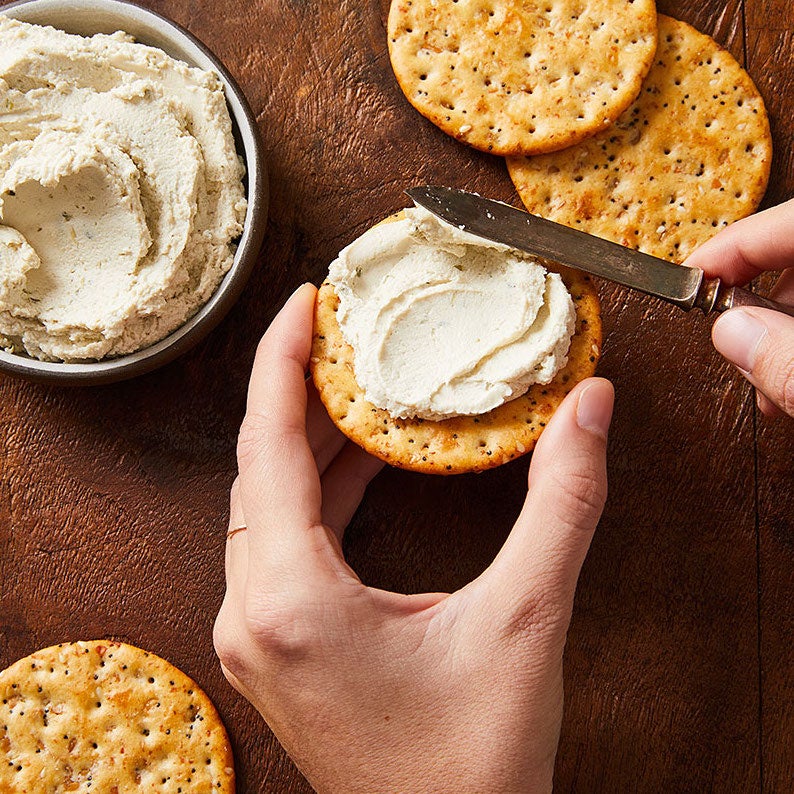
Another favorite vegan cheese producer at the show was Treeline, which is best known for their Boursin-like, French-style herb cheese spreads. Their cashew-based line up has recently expanded as they introduced cream cheese, hard cheese slices and shreds, and new goat-cheese style spreads.
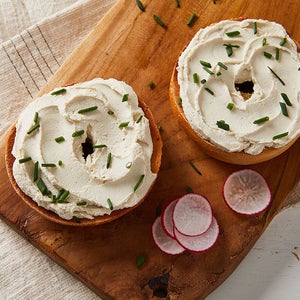
Their cream cheese is available plain, chives, and strawberry; their goat cheese comes in plain, garlic and basil and blueberry. Slices and shreds melt exceptionally well (see photo) and are available in mozzarella, cheddar, and pepperjack.
Treeline slices melt well, like in this panini.

The goat cheese was mildly tangy and combined well with fruit like blueberries or tomatoes.
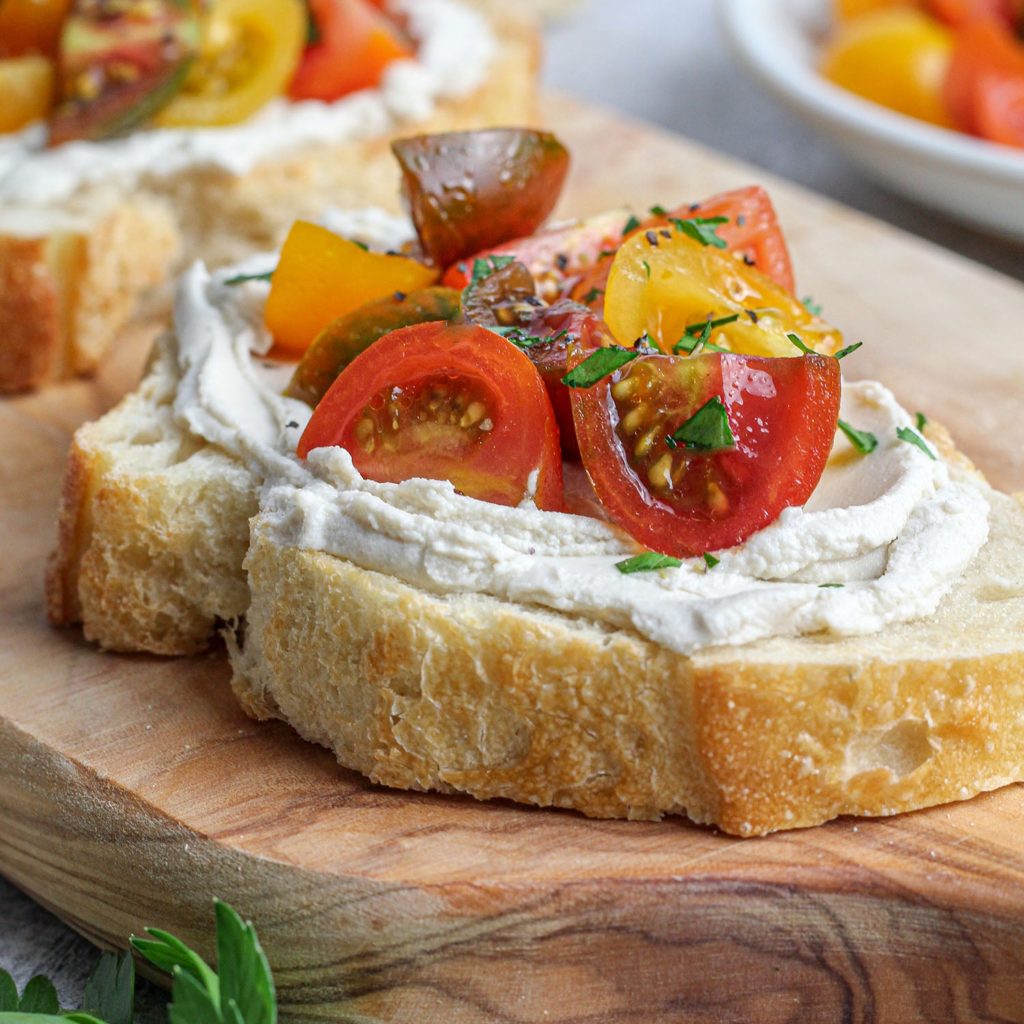
All are Kof-K pareve and are available at Whole Foods and online.
Violife is another brand of kosher vegan cheese in several varieties. Its products come from Greece, and are sold around the world, including Israel. They have continually improved and expanded their offerings, and the current big buzz in vegan circles is their feta.

I am not the biggest feta cheese fan, but I can attest that this was very good. Just the right texture and saltiness, it belongs on any Greek salad served at a vegan (or meat) meal.
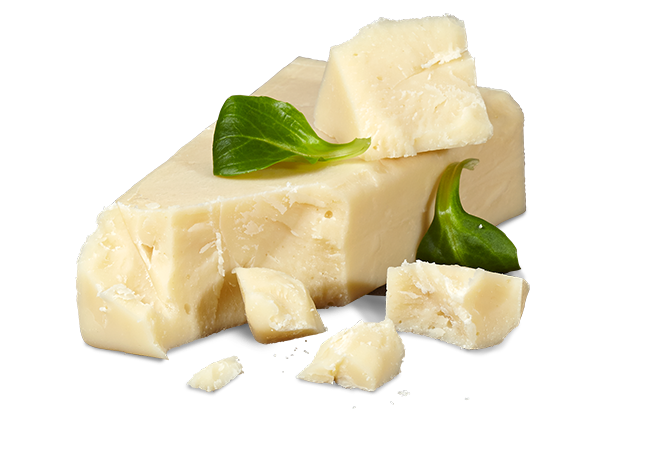
Their parmesan was also very flavorful and a good substitute for sprinkling over pasta or on salads. Other products widely available at supermarkets include cream cheese, a unique haloumi-style grilling cheese, smoked and mature cheddar clocks, slices and shreds, and a chocolate spread.

Their product mix varies by country, with different flavor profiles for each market. Certified pareve by Balkan Kosher (a Chabad affiliate recognized by major US agencies).

Good Planet, a Washington-based company, makes a variety of meltable slices and shreds, including American, Cheddar, Pepper Jack and Provolone, all certified pareve by the OU. Their snackable wedges (think Laughing Cow) are not yet kosher certified, but the company expects them to be soon.
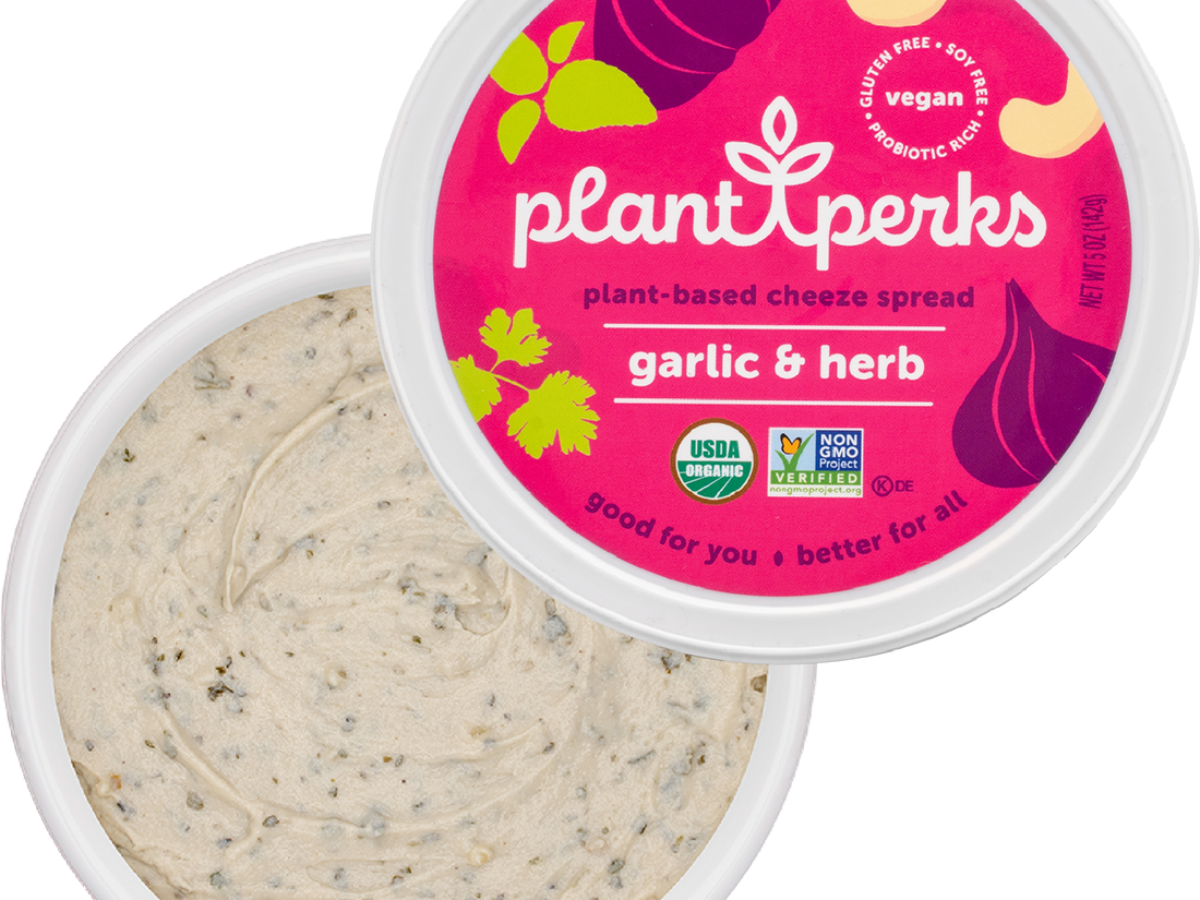
A women-owned company, Plant Perks makes delicious spreadable cheeses and dips in a variety of flavors (French Onion and Buffalo Blue dips, Smoked Gouda, Dill Havarti and Garlic & Herb Cheeze spreads—note that the sriracha cheddar is not currently kosher approved). Perfect for a party, these are certified DE by the OK due to the co-pack facility.

Finally, Seed to Spoon makes cultured dairy products, including cream cheese (plain, strawberry, and garden vegetable), oat milk yogurt, and cultured sour cream, all OU pareve. Using coconut, beans, and oats, their products are creamy and sour, just like the dairy they replace.
CONCLUSION
The variety of dairy alternatives continues to grow, with vegan cheeses, yogurts, sour cream, and butter making major inroads into the market once dominated by cows’ milk. The products I sampled were delicious alternatives and give kosher-observant people, vegan or not, new options to enjoy.
- To be fair, many traditional cheeses do not melt well. Cheddar tends to separate into fat and milk solids, goat cheese softens and then dries out, and fresh mozzarella is really too wet for most pizzas. That is why cold pack cheese food—think American Cheese or Velveeta—were invented, to melt nicely without separating. Pizza cheese is a combination of mozzarella, muenster and sometimes other cheeses, that have reduced moisture so that pizza does not get soggy. Anyone who has had a lasagna or pizza that was too liquid knows the dangers of fresh mozzarella—save it for caprese salad.[↩]



